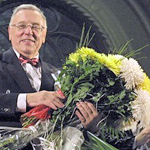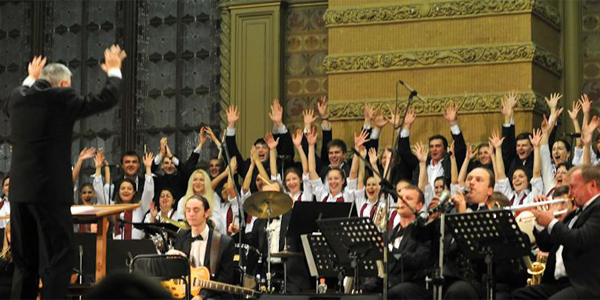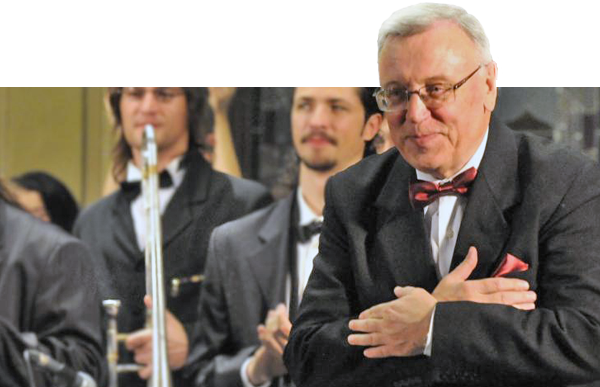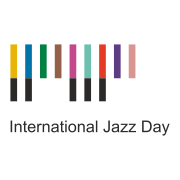
He is a well-known jazz musician and loved by jazz community, the founder and artistic director of the Odessa Big band. Nikolay Goloshchapov over 30 years heads jazz department of the Odessa College of Art and Culture named after K.F. Dankevich.
Nikolay Goloshchapov — a member of the Organizing Committee and jury of the first International Festival-contest of Jazz Improvisational Skills "Master-Jam" — answered questions from our project coordinator Vlad Chubarev in philharmonic hall during a break between rehearsals with the big band.
Private entrance of the philharmonic. 17:30 sharp. Nikolay Yakovlevich, as always punctual, came up, as it was agreed, half an hour before the rehearsal with youth big band to answer our questions on «Master-Jam» Festival-contest whose organizer and jurymen he is. Coordinator of the project «Master-Jam» Vlad Chubarev is asking him questions.
— What attracted you personally in this contest and why you agreed to join the Organizing Committee and jury of the festival?
— There are a lot of contests now, zillions, and this contest has a very important feature. I would like to emphasize why this competition attracted me in general and why I am so happy and willing to collaborate with Mikhail Pavlovich Freidlin. the fact of the matter is that modern Russian musicians tend to have a focused specialization. If a musician plays in a symphony orchestra, he’s unlikely to play in other orchestras; if a musician plays jazz music, he neither can play in other orchestras. It is not quite correct, because the world practice requires from musicians to be multifunctional. I know a lot of examples where the musicians are equally qualified to play in symphony and jazz orchestras. Of course, they choose a certain genre, but, nevertheless, by level of education they should be able to play all of them. I think that sooner or later we will have to come to this because this is the world practice. And that’s exactly what suggests Mikhail Pavlovich in the conditions which he worked out, in the conditions he envisaged in this contest. That is, the main thing is that these should be «multiprofile» musicians who equally well play rock music, jazz music, funk, Latin, and so on and so forth. That’s why I just enjoy collaboration with Mikhail Freidlin.
— The program of the Festival-Contest «Master-Jam» is represented by five styles: mainstream, funk and jazz rock, fusion, Latin jazz and jazz ballad. In your opinion, given the modern jazz realities, may some styles be missing?
— The fact is that we, Mikhail Pavlovich and I, have talked on this subject, since he has been conceiving the idea for years... I think this is quite enough to cover the main trends, because there may be a lot of subspecies, «sub-styles», «sub-genres», but these are the main styles. I think that everything here is done properly.
— What do you think this festival will bring in to the jazz life of Ukraine and of young musicians?
— I think it might give rise, and I really hope it will give rise to the growth of professionalism of the musicians involved in jazz. the growth of professionalism — I am emphasizing this once again. Just because of what I said in answer to your first question.
— Does this only apply to participants or to spectators also, among them there can be a lot of musicians as well?
— This process is always reciprocal, because musicians play for themselves, but they also play for the listener. Listeners, in turn, when listening to different musicians, raise their level of «listener» qualification. I think that the main shortcoming of the current state of affairs in the arts in general and in music in particular is the lack of awareness-raising work. There is a need of much more festivals, more lectures, concerts accompanied by lectures, subscriptions and so on and so forth. I know what I’m saying because a lot of listeners and especially young people only feed on what they are treated with from TV broadcasts. And this is, as a rule, popular music, well, at best, a little bit of rock, but it is only one of music trends in general. Jazz remained overlooked by popularization work; classical, opera, symphonic music, in fact, are not being promoted at all. This is wrong. I very much hope that the jazz Festival-contest, which Mikhail Freidlin is setting up, will make a tangible contribution to this very important, in my view, matter.
— Do you expect that this new idea will enliven the enthusiasm around jazz and will spur the professional growth of our musicians exactly due to the freshness of this idea, because there was nothing like this nowhere?
— Well, you, in fact, have answered your question. Yes, that’s right; this is what we very much look forward to. We really look forward to an event to stir up interest from musicians, artists and the general public..
— You mentioned pop and rock music. Is it true that modern jazz realities imply the use of elements of these children and grandchildren of jazz?
— So, it’s just like that: music, on the one hand, is aesthetics. That is, when a person comes out on stage, and makes something, and when the audience consumes this «product», this is the aesthetic aspect. But there is still the techniques aspect. This is when a musician learns to play, develops various styles etc, etc. So, I’m deeply convinced — it just what the long-term world practice shows — that the basis of all modern styles, genres etc is, first, classical music, second, jazz music. All «bubble-gum» music still originates from here. All the same, it is originally from jazz or classical music, or synthesis of both. During 32 years I have been in charge of the variety-jazz department in the school of music, therefore for 32 years we have been teaching young people jazz music not because we want to make them jazz musicians, but because the techniques of jazz music is the foundation of any instrumental performance: pop music, rock music, and so on and so forth.
— This is what develops aesthetics and sense of beauty in pupils?
— Well, also this, of course. This is the main thing we strive for. But I’m speaking about techniques. Techniques are a must. And any music develops sense of beauty, although there is music which may, on the contrary, stultify the person, but this is already subject of another conversation.
— What can you say about such common now in the West technique of simulating percussion instruments with the help of speech apparatus as «beatbox», which came from the hip-hop culture, and its dissemination?
— Firstly, imitation of sounds of musical instruments using the vocal apparatus has not spread only now... This has a certain musical term. This is called «scat». This is like vocalization, like singing without words. There’s one important detail: this is not just a set of sounds «Diba-Duba-Diba-Daba», this is imitation of play on respective wind instruments, and therefore, scat, or whatever you call it, has a certain technique basis. One must learn it, what we, in principle, do, but it’s not new. the idea of national component in art is good in itself, but it is not unique. There must be a lot of components, including national and international. Jazz in its present condition is an international art. This is planetary art. It can no longer be attributed exclusively to Africans or Latinos. This is an achievement of the modern planetary civilization. So it should be treated respectively.
— Question about folk characteristics and internationality of jazz: Nigeria, Cameroon, and South Africa have their own jazz associations and they are quite numerous. In your opinion, what might be notable in participants from these countries? What may be the special feature of their jazz traditions, if one can speak about jazz traditions in these countries? And can it happen that jazz musicians from these countries use unusual for jazz ethnic instruments?
— This question is a bit particular, since we started talking about the contest in general. First: I don’t think I can judge in this respect, and I have no idea about jazz situation in the Congo and the Republic of South Africa. I have never been there, and I have no idea about how matters stand there. But the overall trend, as it seems to me, is just this: the absolute combination of both national and international, and to what extent, to which degree, on which artistic level — it all depends on the talent of the people who are engaged in this. I know a lot of African musicians who play jazz brilliantly, but, of course, it’s their nature. It can be said that the roots of jazz music come from African, Afro-Cuban folk music. But jazz just went so far, it assimilated thus much with other different genres of music that, of course, now nobody can speak of an exclusive priority of African origin. This is a modern, concert, planetary, philharmonic art.
— I haven’t asked accidentally about remote and exotic countries from the African continent because one of the goals of the Festival-contest «Master-Jam» is to collect a wide range of musicians from around the world, up to jazz improvisers from such countries.
— Well, you see, of course, this is great, because any exchange of views, exchange of ideas, any exchange of information is wonderful for everybody. I remember how about 40 years ago an arrival of two Japanese jazz bands was a bombshell. Japan and jazz ... one would think: Asian continent, African roots of jazz born in America ... It was great! It was just wonderful! I remember the first Japanese Orchestra «Sharps and Flats» which worked in the Palace of sport. We were just stunned on how skillfully they played modern at that time swing jazz music. Once again I want to stress with this that music is international!
— During 32 years you are in charge of the variety-jazz department, you have a great experience in jazz, and surely a great experience of refereeing in jazz contest juries. Would you tell me how an improviser of average level can be distinguished from a real diamond?
— the fact of the matter is that in art in general and in jazz in particular, there is no physical categories: who jumped further, who ran faster... All of this is a matter of taste; all depends on the qualification, on «listening experience and ability» of those who judge. When you come for the first time at a concert, let’s say, of a symphony orchestra, you listen and understand nothing — well, they play and may play. When you come for the tenth time, you start already thinking: this was so, and this was so. This generates the taste, then taste skills, ability to compare, collate and feel this music. I find incorrect the expression «I don’t understand this music». Music is not to be understood — it should to be felt, but the feelings are to be fostered. Of course, this process is quite lengthy and need exclusive skill. We recommend to our students in mandatory manner and require them to listen to good music as much as possible, and to listen to it not as a decorative attachment to their everyday activities, but as a focused study of what sounds: who plays, who sings, what instrument they play, to which style this music belongs etc, etc. So, if we go back to the beginning of your question on what basis we judge — on taste.
— That is, this is the matter of skills — the rational area — or is it the area of senses? Or both?
— Both, of course. Because, you know, a professional musician should be able to distinguish for all that: this sound timbre is better, this one is worse. This person’s play is more dynamic, that one’s less dynamic, and so on, but on the other hand, in the end, it is still sort of rationalizing senses when it comes to judging in certain creativity competitions. Yes, there is a rational evaluation of what is happening. But, however, one cannot do without emotions and without feelings which guide us, or respond or don’t to what is happening on the stage. Both are equally important.
— During the qualifying round, the jury will evaluate the video presentations which jazz improvisers from all over the world send in. Some participants submit to the jury’s approval pre-rehearsed works, and not improvisations. Can such «works» say anything about their impromptu abilities?
— You understand what’s going on, in any case you can hear whether this man is improvising or playing from music. But it is already the experience; it is listener’s qualification, because nothing, whether rehearsed and played from music, can replace a live improvisation. Someone might say: one can do a few takes and choose some inspired improvisation. Yes, they can. What then? — It’s all right. Even top-notch improvisers play one time better, other time worse. Anything can happen, this is improvisation. That’s the art of improvisation, which is a spontaneous process that is going on right now. No one can feel secured against relative failures, but, of course, all this depends on the skill level — what is failure for one, for the other is an unattainable peak. This is art.
— Will it be important for the jury to decide by video presentation, if a musician is able to be not only a soloist, but also to feel the whole team?
— Of course, this is just the art of improvisation. If he performs as a soloist, he is accountable only to himself, if he improvises in the ensemble, of course, the feeling of the ensemble is one of the components of the performance process, i.e. his solo improvisations and his feeling of ensemble in relation to partners with whom he plays — all this is extremely important.
— Do you think there is a risk that in some ensemble there will be «self-serving» musicians not able to feel each other?
— Well, generally, of course, there is some risk. What then? «Coward, as they say, does not drink champagne». Maybe something will work out, and something will not — it’s all right.
— Do you believe in the success of this undertaking?
— I certainly believe in success! It seems to me that it will not be creative aspects that can interfere with this contest, but rather organizational ones: the matter of trip, money, hotel and so on and so forth, and someone might just not find money for such a trip — this can happen. There’s a certain threat in this, but I’m not competent to answer these questions. I think Mikhail Pavlovich is a wise and experienced person, and I think he will cope with this.
— The last question: How do you feel about the fact that among 9 instrumental nominations the whole three are dedicated to the winds?
— What does it mean «How I feel about»? (Bewildered) These are three most important instruments of jazz orchestra. Because the toolset of the modern jazz orchestra has a very clear representation: saxophone, trumpet, trombone, guitar, bass guitar, drums and piano. These are the seven specializations we teach at the Jazz Department of the Odessa College of Music, these are the instruments which are generally taught to play in the world. This is not a law; there may be exceptions to this rule. We know prominent flutists, jazz improvisers. There are not many, but excellent improvisers — French horn players. French horn would not seem to be a jazz instrument, however, see just one person — Arkady Shilkloper — isn’t he a grand! That is, there are no dogmas in music, there are exceptions to every rule — and thank God!
— And thank God! Let the Festival «Master-Jam» be no exception to a number of successful jazz festivals in Odessa.
— I think it’s a nice ending to our conversation. Let us wish that this Festival-contest be a success and keep our fingers crossed, and use all available means to help this wonderful endeavor, whose author is Mikhail Pavlovich Freidlin; and we according to our lights must try to help.
— Thank you very much for the interview.
— Welcome. (He looks at his watch)
It’s five to six — I need to be in the hall...
Bye-bye!








We would be grateful for your feedback!